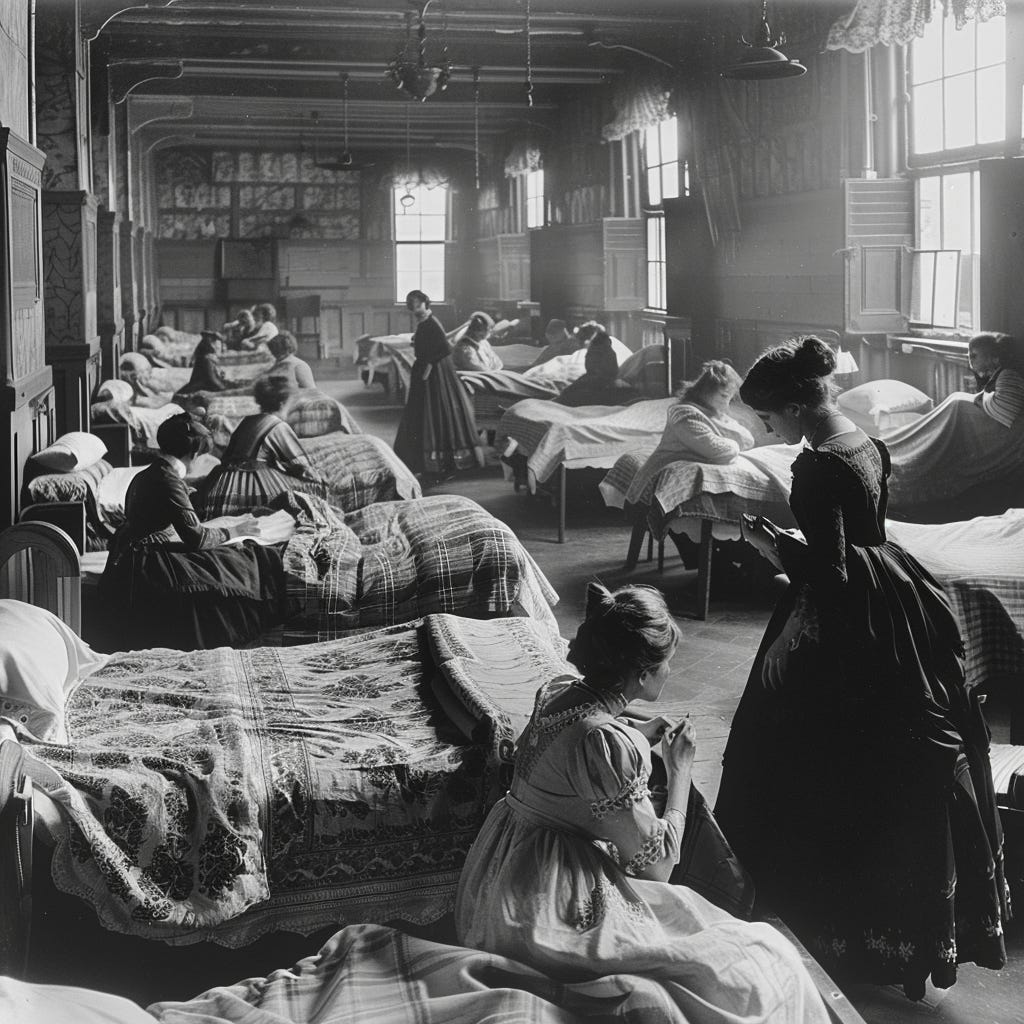200 Years Ago My Hormones Might Have Landed Me in an Asylum
In Victorian times, my menopause-induced mood disorders would have been interpreted as climacteric insanity
“I have to quit my job. This is not sustainable.” This sentence or a variation of it has been running through my head almost every day for months. Why?
Menopause has made the effort I have to put in to get through the day feel like too much of a burden.
I crave rest; I’m tired all the time. And I’m resentful and irritated because everything feels so draining.
For one in ten women, not finding the right help for their menopausal problems leads them to give up their jobs. And like me, 23% of these women consider doing it.
Fatigue is one of the most common symptoms of menopause. I didn’t know that. So, I wondered if there was something fundamentally wrong with me. Whether I was suffering from depression or had a terminal illness. Or had lost my mind?
But no, I’m not crazy. Turns out it’s “only” hormones.
If you haven’t heard, the road to menopause isn’t all fun hot flashes and night sweats. It’s also mood swings, angry tantrums, and the urge to lay down on the ground and sleep for 24 hours.
And tons of other symptoms doctors fail to mention or understand.
Perimenopause — the years or months leading up to your menopause can make you feel like you’ve gone over the edge. And thanks to the fact that many doctors have no idea how to treat this transition properly, they’ll likely make you feel as if you have.
Spoiler alert. It’s not you; it’s them — and the hormones, of course.
Many doctors are still not aware that mood disorders are common during menopause. It’s not their fault. Their training doesn’t cover it.
According to a medical survey conducted in 2022 in the UK, 41% of the 32 schools that took part did not teach their students anything about menopause at all.
So doctors are just as stumped as you are when you come to them with emotional symptoms. Or itchy ears, burning tongue, or hot feet. And believe it or not, rectal pain.
Yes, these are all real symptoms. I learned about them from the hundreds of comments on my recent Threads post about menopause.
Itchiness features very highly on the list of reported symptoms there. And this makes a lot of sense when you realize that the hormone change makes your skin and mucus dry. Hence the itching.
A lot of these issues are irritating at worst, but the mental health impact is undeniably the hardest to bear.
It can make it feel impossible to be a functioning adult at work or at home.
And you might feel as if you’ve gone off people. Everyone is irritating, even your loved ones. But don’t file for divorce just yet. It’s the hormones. Again.
One of the women on my post told me:
Nearly every woman I know who is post menopause had a phase where they HATED their partner. The way the breathed, ate, smelled, drove, sighed, spoke. It was the hardest part for me. I remember my mom going through it.
All the negative emotions, the sadness, the depression, the anxiety, and the fatigue slowly sucked all the joy out of me. Until it felt too much to handle.
But I won’t quit my job — mostly because I already went down this route two years ago and took a four-month time out, which changed nothing.
A lot of women will quit their jobs.
Workmind reports that according to a survey of 2000 women by SimplyHealth in 2023, 23% of women are considering resigning due to the effects of menopause, and 14% said they plan to hand in their notice.
This is an unbelievably high number of women who suffer a financial impact due to a transition that is a natural, unavoidable part of life.
It’s not just the momentary loss of income. It also means less money in retirement. Just like women suffer an income dip due to pregnancy, they experience a financial disadvantage when they reach menopause.
And it’s not just those who actually give up their job. Many who stay can’t reach their full potential because menopausal symptoms limit their productivity.
In her bestselling book “The New Menopause” Mary Claire Haver, MD, tells us:
Many women have reported that menopause disrupts their ability to work. In a 2019 survey conducted in the UK, of one thousand women over the age of forty-five, symptoms such as hot flashes, low mood, trouble concentrating, memory challenges, increased depression and anxiety, and lessened self-confidence were noted as factors that contributed to making more mistakes, losing promotions, and even quitting a job altogether.
If only a few women struggled with this transition, we could shrug it off as individual hardship. But according to Cardiff University, 50% of women going through menopause experience symptoms of depression or insomnia. 50%!
If you add other unfun emotional symptoms like nervousness, anxiety, irritability, and anger, the numbers go up to 75%.
But I didn’t know any of this.
Because all you ever hear about is hot flashes, night sweats, and hair loss. And getting fat, of course.
In my post about menopause symptoms, hundreds of women chimed in with their experiences. It was mind-blowing.
But it also immediately made me feel better about myself. Part of my fatigue and low mood were caused by not knowing what was going on and constantly fighting to feel “normal” again.
Now I know I am normal.
Like me, many women suffer from mood swings and outbursts of anger that are so bad that they would have ended up in an asylum in Victorian times — diagnosed with climacteric insanity.
It’s hard to describe how out of control your emotions can be when you’re going through the menopausal transition.
Christy, one of the commenters on my post, mentioned doom flashes:
Here’s one I had to google: Impending doom flashes. Like, I break into a cold sweat, my heart starts racing, and I just have this overwhelming sense of dread. I’ve learned it’s in the ballpark of normal. But man, is it weird, and I was not told it was a thing.
That’s how it felt for me too. Out of the blue, I had the feeling that something terrible was going to happen. Heart racing, anxiety rising. Fun times.
Now when my heart abruptly races, I know nothing is wrong; I’m not having a panic attack. It’s not a heart attack. There’s no danger around the corner. It’s just wonky hormones.
I take a deep breath and move on.
Talking openly about my symptoms instead of suffering in silence has helped me find others who experience the same.
What helped me feel less horrible — besides hormone replacement therapy (HRT)— was finding out that what I’m experiencing is normal.
In the Victorian era, doctors believed that there was a connection between the uterus and the brain that made all women susceptible to insanity.
This was thought to be especially true of women in menopause who were believed to suffer from a condition called “climacteric insanity.” As a result, they believed the only logical treatment was to lock up these women in asylums.
And yes, for a while, I felt insane. Ready to be admitted to an asylum. If only to rest for a while.
I was on an unmanageable emotional rollercoaster. Sad. Angry. Melancholic. Irritated. You name it, I’ve felt it on a given day. Sometimes within an hour.
Menopause comes with the craziest symptoms. Symptoms you’d never associate with it. Like a frozen shoulder, tinnitus, and eyelid sweats.
Again, I’m not making these up; sweaty eyelids were mentioned at least three times in the comments to my post.
It can feel like something is very wrong, but it’s a “normal” transition that all women go through. It’s just that no one tells you what it’s going to be like. At least no one told me anything beyond what I learned from jokes about women feeling hot for no reason.
So when you experience all these out-of-pocket symptoms, you don’t know what to attribute them to. And chances are high your doctor doesn’t either.
So you’re left to find out how bad this change can be when you’re confronted with this stranger that now inhabits your skin.
But don’t quit your job just yet.
Find a doctor who listens to you and tries to understand. If necessary, print out supporting material from Dr. Mary Claire Haver’s website, “The ‘Pause’ Life,” and take it along to your doctor to help educate them.
Talk to other women. Finding other women who are going through the same thing and understand will help you feel better immediately.
If you’ve enjoyed my writing and want to support me, buy me a cup of coffee! To keep reading about my menopause journey and thoughts, subscribe to “The Menopause Brain” or follow me on Threads







